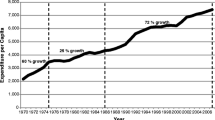Abstract
World Values Survey data, collectedJune-October 1990, are used to exploredeterminants of individual welfare in variousregions of the Soviet Union. Emphasis isplaced on the role of household income andperceived health status in determining thehappiness of an individual. Comparisons aremade across five Soviet regions and between theSoviet Union, the U.S., and West Germany. Thedata indicate similar patterns existedregarding welfare determinants though Sovietcitizens were relatively unhappy. There arealso differences between the two marketeconomies and the Soviet Union regarding theextent to which income influenced health andhappiness.
Similar content being viewed by others
REFERENCES
Alesina, A., R. Di Tella and R. MacCulloch: 2001, 'Inequality and happiness: Are Europeans and Americans different?' NBER Working Paper 8198.
Bergson, A.: 1984, 'Income inequality under soviet socialism', Journal of Economic Literature 23(3), pp. 1052-1099.
Blanchflower, D.: 2001, Unemployment, Well-Being, and Wage Curves in Eastern Europe. Mimeo.
Blanchflower, D. and R. Freeman: 1997, 'The legacy of communist labor relations', Industrial and Labor Relations Review 50(3), pp. 438-459.
Deaton, A.: 1999, 'Inequalities in income and inequalities in health'. Research Program in Development Studies, Princeton UniversityWorking Paper (May).
Deaton, A. and C. Paxson: 1998, 'Aging and inequality in income and health', American Economic Review 88(2), pp. 248-253.
Di Tella, R., R. MacCulloch and A. Oswald: 2001, 'Preferences over inflation and unemployment: Evidence from surveys of happiness', American Economic Review 91(1), pp. 335-341.
Easterlin, R.: 1974, 'Does economic growth improve the human lot? Some empirical evidence', in P.A. David and M.W. Reder (eds.), Nations and Households in Economic Growth: Essays in Honor of Moses Ambromowitz (Academic Press, New York and London).
Easterlin, R.: 1995, 'Will raising the incomes of all increase the happiness of all?' Journal Of Economic Behavior and Organization 27(1), pp. 35-47.
Easterlin, R.: 2001, 'Income and happiness: Towards a unified theory', Economic Journal 111(473), pp. 465-484.
Frey, B. and A. Stutzer: 2000, 'Happiness, economy, and institutions', Economic Journal 110(466), pp. 918-938.
Kim, B-Y.: 1997, 'Soviet household saving function', Economics of Planning 30(2), pp. 181-203.
Kim, B-Y.: 1999, 'The income, savings, and monetary overhang of soviet households', Journal Of Comparative Economics 27(4), pp. 644-668.
Milanovic, B.: 1998, Income, Inequality, and Poverty during the Transition from Planned to Market Economy (The World Bank, Washington, D.C.).
Nove, A.: 1992, An Economic History of the USSR: 1917-1991 (Penguin Books, New York, NY).
Ofer, G. and J. Pickersgill: 1980, 'Soviet household saving: A cross section study of soviet emigrant families', Quarterly Journal of Economics 95(1), pp. 121-144.
Oswald, A.: 1997, 'Happiness and economic performance', Economic Journal 107(445), pp. 1815-1831.
Pickersgill, J.: 1976, 'Soviet household saving behaviour', Review of Economic Statistics 58(2), pp. 139-147.
Rampichini, C. and S.S. D'Andrea: 1998, 'A hierarchical ordinal probit model for the analysis of life satisfaction in Italy', Social Indicators Research 44(1), pp. 41-69.
Roberts, B.: 1997, 'Welfare change and the elimination of the shortage economy in Russia: Some representative household results', The Economics of Transition 5(2), pp. 427-451.
Rose, R. and I. McAllister: 1996, 'Is money the measure of welfare in Russia?' Review of Income and Wealth 42(1), pp. 75-90.
Solnick, S. and D. Hemenway: 1998, 'Is more always better? A survey on positional concerns', Journal of Economic Behavior and Organization 37(3), pp. 373-383.
Veenhoven, R.: 1999, 'Quality-of-life in individualistic society', Social Indicators Research 48(2), pp. 157-186.
World Values Study Group: 1994, World Values Survey, 1981-1984 and 1990-1993 (ICPSR version). Institute for Social Research, Ann Arbor, Michigan (producer), Inter-university Consortium for Political and Social Research (distributor).
Author information
Authors and Affiliations
Rights and permissions
About this article
Cite this article
Smith, K. Individual Welfare in the Soviet Union. Social Indicators Research 64, 75–105 (2003). https://doi.org/10.1023/A:1024728111718
Issue Date:
DOI: https://doi.org/10.1023/A:1024728111718




